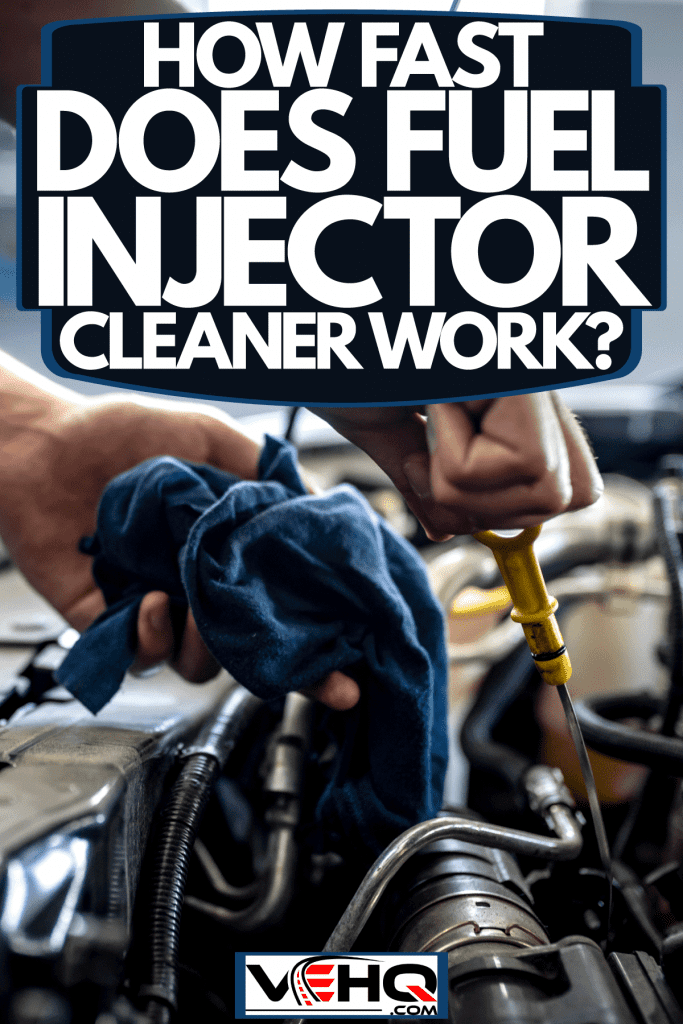Have you been noticing that your car's gas mileage has decreased lately or that it isn't accelerating as quickly as it used to? You may be planning to treat your engine with a fuel injector cleaner to improve its performance. So, once you've added fuel injector cleaner, how soon should you see better engine performance? We've done the research, and we have the answers for you!
Although fuel injector cleaner starts working as soon as you put it into your vehicle's tank, it takes time for the effects to become noticeable. You should begin seeing results within 100 - 300 miles after you use fuel injector cleaner.
In the remainder of this article, we'll describe the factors that influence how fast fuel injector cleaner works. We will also explain what fuel injector cleaner does, how often and how much of it to use, and how to test your fuel injectors for clogging. Keep reading to learn more!
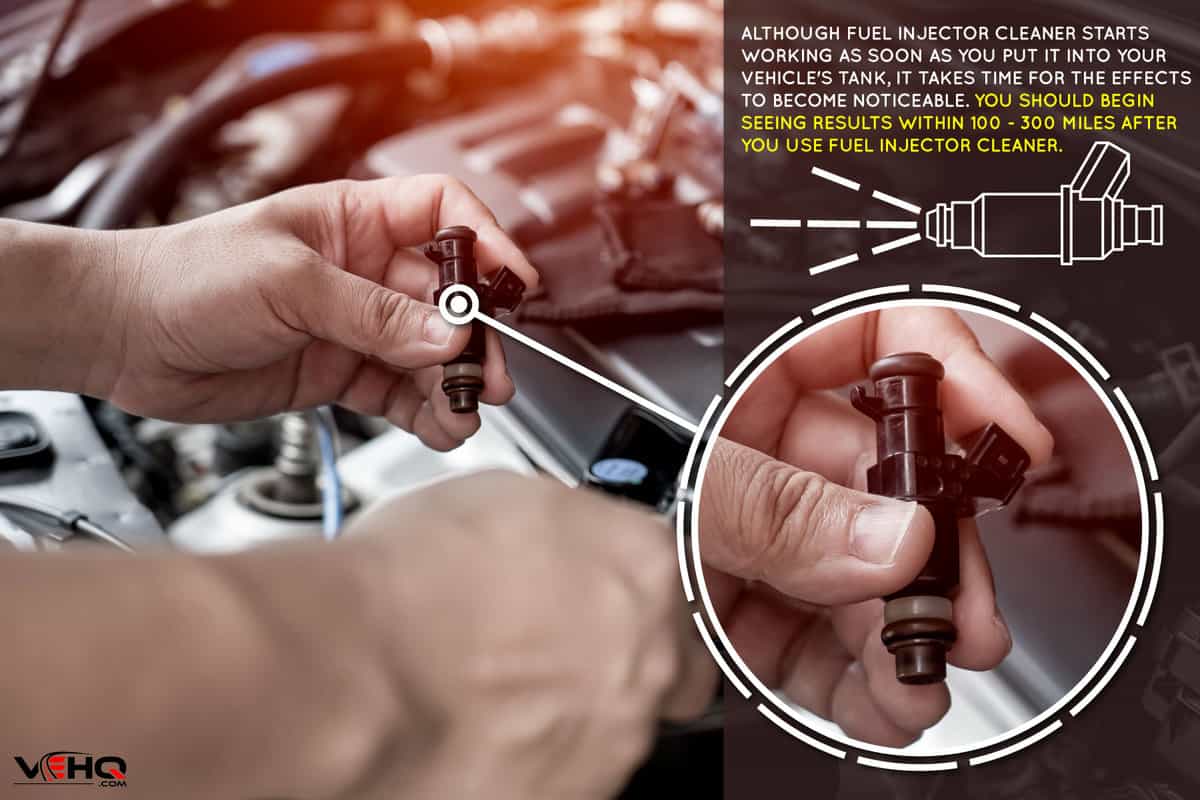
How Fast Fuel Injector Cleaner Works
Fuel injector cleaner begins working immediately after pouring it into your vehicle's gas tank and starting driving. However, it will take some time to have a noticeable effect on your engine's performance. You will likely begin to see results -- higher gas mileage, better acceleration, and smoother idling -- within 100 to 300 miles of driving.
The speed with which the fuel injector cleaner works is influenced by two major factors: the condition of your vehicle's fuel system and the type of fuel injector cleaner you use.
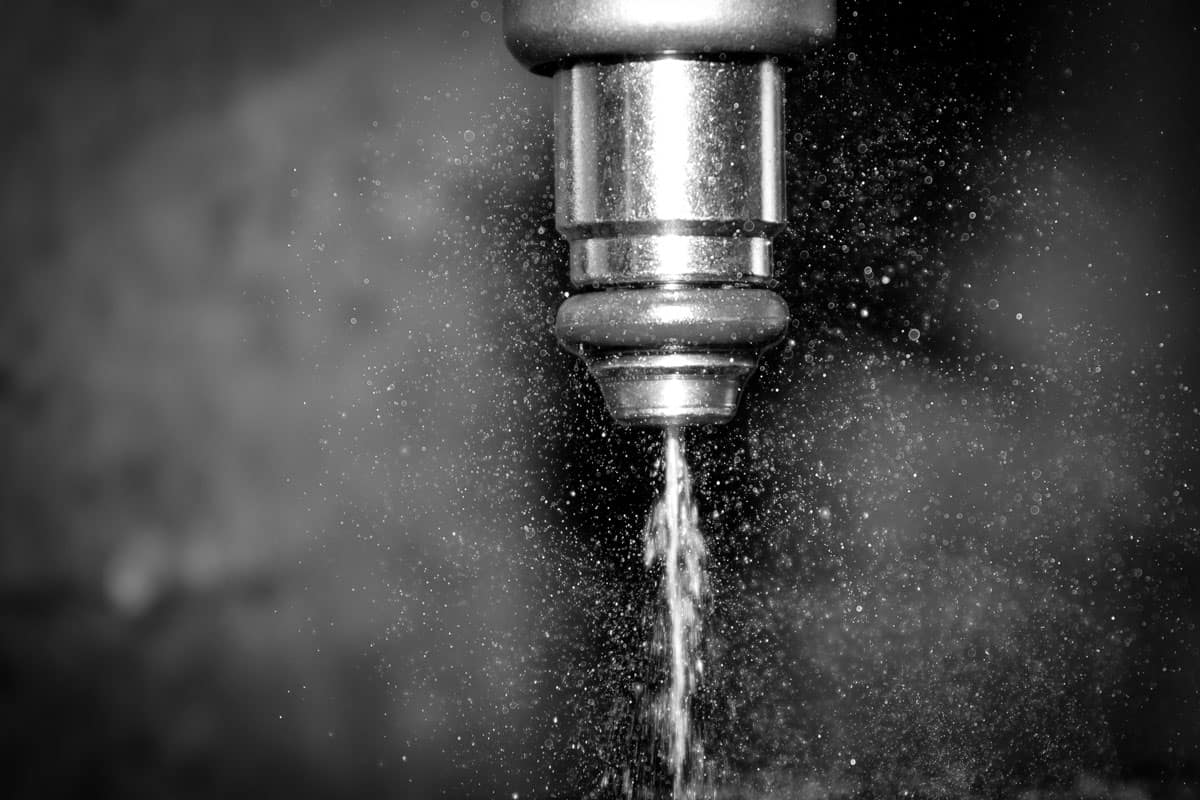
Condition Of Vehicle's Fuel System
If your vehicle's engine is relatively new, or if you have kept it well maintained, it will likely not have much sludge built up in it. In this case, the fuel injector cleaner will dissolve the sludge rapidly, and your vehicle's engine will quickly return to peak performance.
If, on the other hand, your engine is older and has major buildups in the fuel lines, injectors, and combustion chamber, it will take longer for the fuel injector cleaner to do its work and eliminate all of the debris and sludge in the fuel system.
Type Of Fuel Injector Cleaner Used
The type of fuel injector cleaner you use is another important factor in determining how fast it works. Fuel injector cleaner is basically a dissolving agent whose job is to break down debris and sludge in the fuel lines, injectors, and combustion chamber.
There are literally dozens of different fuel injector cleaning products on the market, each with a unique chemical formula. The strength of the dissolving effect in each product depends on how it combines three chemical compounds:
- Polyether amine (PEA) is a strong dissolvent, ideal for fuel systems with a lot of build-up. It also helps to eliminate small amounts of water in the tank and fuel lines.
- Polyisobutylene (PBI) is a medium-strength dissolvent used in fuel injector cleaners for gasoline and diesel engines. It is best for removing carbon buildup in the combustion chamber.
- Polyisobutylene amine (PBIA) is the mildest of the three compounds. It is most effective at maintaining clean fuel lines, injectors, and combustion chambers rather than for dissolving debris already in the system.
Click here for LucasOil fuel injector cleaner on Amazon.
What Does Fuel Injector Cleaner Do?
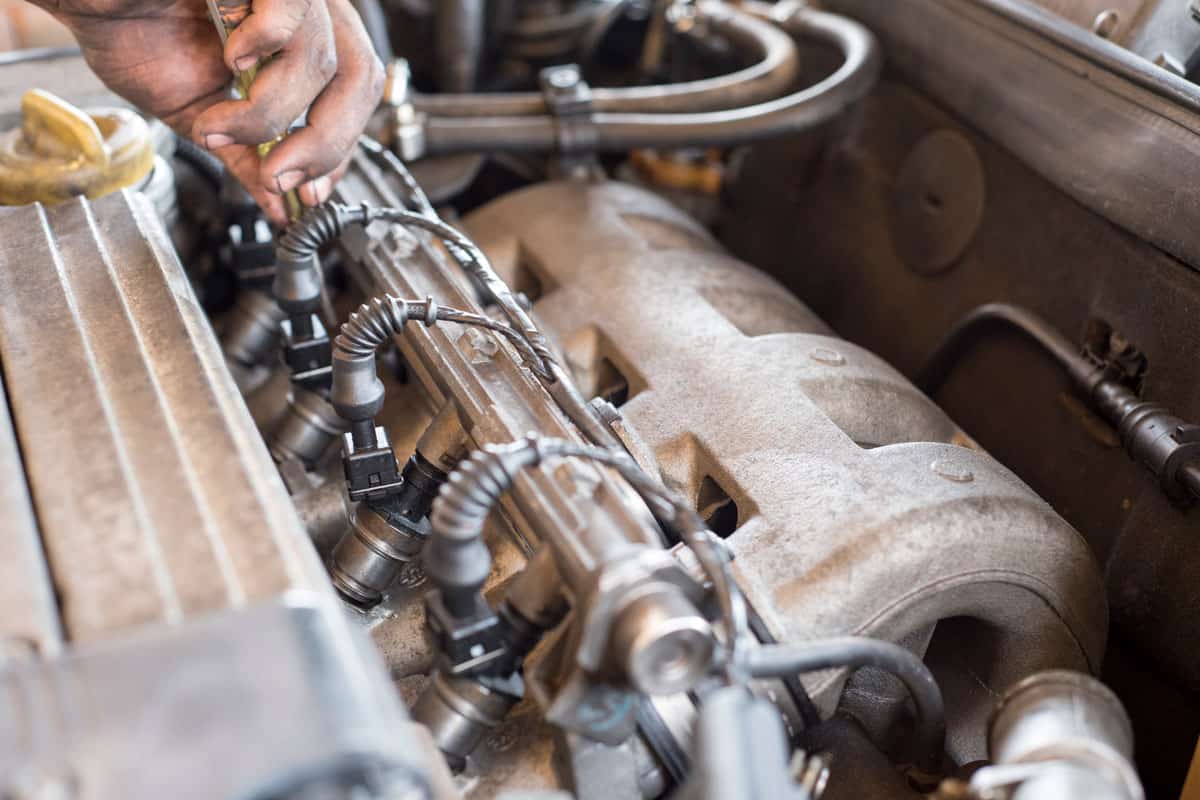
Your car's fuel system includes the gas tank, fuel lines, fuel injectors, and combustion chamber. As your car runs, gas travels from the tank through the fuel lines and fuel injectors. The injectors have tiny nozzles that spray fuel into the combustion chamber cylinder, mixing with air and ignites. The energy from the burning fuel powers your car's engine.
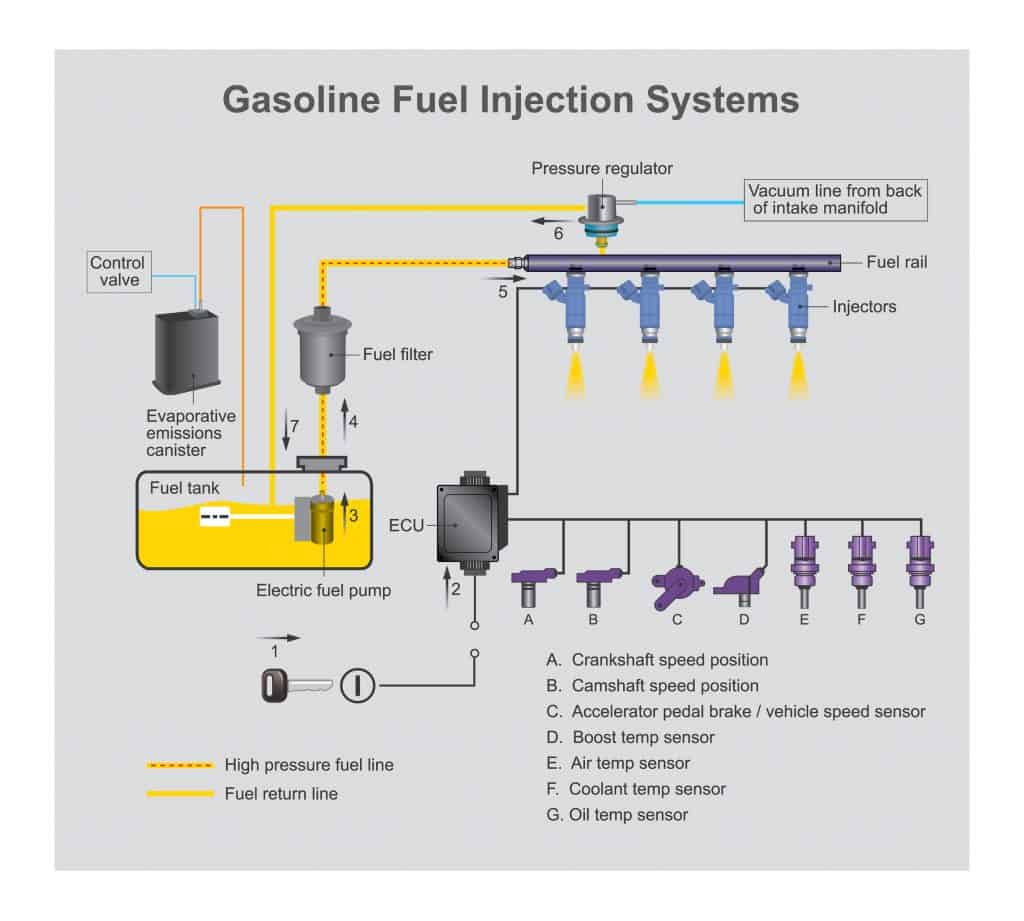
Over time, debris and sludge from several sources can build up in your vehicle's fuel system. For example, despite careful processing during its production, the fuel itself inevitably contains trace amounts of contaminants and water. In addition, the lining of your vehicle's fuel tank can develop rust, which may flake off and enter the fuel stream. And carbon, a by-product of combustion, builds up over time in the combustion chamber.
Fuel injector cleaner, with its detergents and dissolvents, is designed to rid your fuel system of this debris and sludge. After you mix it with gas in your fuel tank, the cleaner then travels through the fuel lines, fuel filter, and injectors, breaking down debris as it goes. It then dissolves carbon buildup in the combustion chamber. The combustion process forces the dissolved remnants of the debris and sludge out through the exhaust system, leaving your fuel system clean and performing at high efficiency.
As your fuel injector cleaner does its work, you can expect to see higher gas mileage, quicker acceleration, smoother idling, and lower emissions.
Click here for LiquiMoly fuel injector cleaner on Amazon.
How Often Should You Use Fuel Injector Cleaner?
You should use a fuel injector cleaner every 1,500 to 3,000 miles, depending on the manufacturer's specifications. Once you've selected a cleaner, read its product label carefully to determine how much to use and how often. Adding fuel injector cleaner more often than recommended does not provide any extra benefit to your vehicle's engine.
Using it less often than specified on the label will allow excess sludge and debris to build up in your vehicle's fuel system, reducing your engine's performance and making it harder for the next dose of fuel injector cleaner to work effectively.
Click here for STP fuel injector cleaner on Amazon.
Can You Use Too Much Fuel Injector Cleaner?
You must use fuel injector cleaner in the amounts and at the frequency recommended on the manufacturer's label. If you mix too much cleaner into a tank of gas, it can result in unburned fuel and cleaner accumulating in the combustion chamber.
And, if you use fuel injector cleaner more often than recommended, its strong chemical compounds will break down seals, gaskets, and other rubber components of your vehicle's fuel system. Both of these situations will ultimately result in costly damage to your vehicle's engine.
Click here for Gumout high-mileage fuel injector cleaner on Amazon.
How To Test For A Clogged Fuel Injector
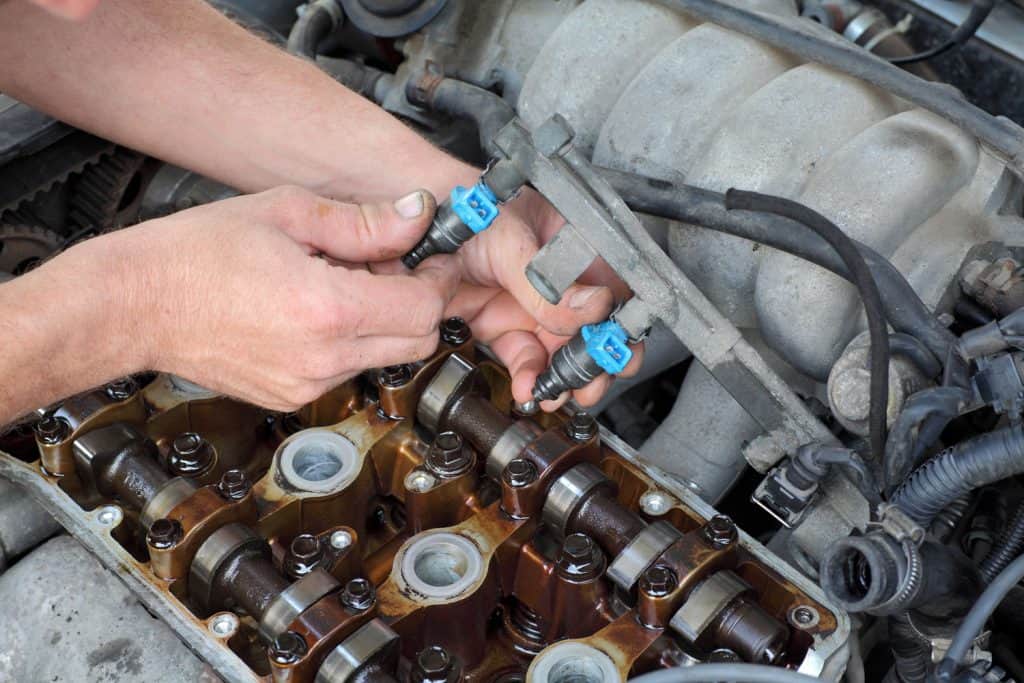
A typical fuel injector lasts for 100,000 miles or more. However, during its lifetime, a fuel injector's nozzle can become clogged with debris or sludge. Some common clues that you may have a clogged fuel injector include:
- Reduced gas mileage
- Rough idling
- Difficulty starting the engine
- Smoke coming from the exhaust pipe
- Slow acceleration
If you notice these signs, you may want to test your vehicle's fuel injectors yourself rather than taking your vehicle to a mechanic. There are three do-it-yourself tests that you can use to determine whether you have problems with one or more fuel injectors.
Safety First!
Before you do any testing, remember that working with your fuel system can be dangerous. Wear long sleeves, protective gloves, and goggles to protect yourself from burns and spraying fuel. Do not smoke while you're working on your car's fuel system. And make sure the engine is cool before you begin any of these tests.
Click Test
The simplest test is the "click test," in which you use a screwdriver like a stethoscope to listen for a clicking sound in each fuel injector. Follow these steps:
- Start the engine and let it idle.
- Lift the hood and secure the hood latch.
- Place the metal end of a long screwdriver against one of your vehicle's fuel injectors.
- Holding the other end of the screwdriver to your ear, listen to the sound the fuel injector is making.
- If you hear a clicking sound, this means the injector is working properly. Silence indicates that the injector is clogged.
- Repeat this process with each fuel injector (one fuel injector for each cylinder in your car's engine).
Exhaust Heat Test
Each cylinder in your car's engine has its own outlet to the exhaust manifold. If a fuel injector is clogged and doesn't spray fuel into the cylinder, no combustion will occur, and that cylinder's exhaust outlet will remain cool. Be very careful not to touch the exhaust manifold if you try this test -- it's extremely hot!
- Turn the engine on and let it idle for 15 minutes.
- Lift the hood and secure the hood latch.
- Locate the exhaust manifold (consult the engine diagram in your Owner's Manual if you're not sure where it is).
- Use an automotive heat marker to touch the metal at the exhaust outlet of each fuel injector.
- If the wax in the heat marker fails to change color at one of the exhaust outlets, then the corresponding fuel injector is clogged.
Click here for heat marker on Amazon.
Voltage Test
You can also use a voltage tester to determine whether one of your fuel injectors is malfunctioning. Make sure the engine is cool when you perform this test; otherwise, you'll get inaccurate results. Before starting the test, consult your vehicle's Owner Manual to learn the standard electrical resistance (ohms) for your fuel injectors.
- Turn the car's ignition switch to the "on" position, but don't start the car.
- Hook up the voltage tester to the negative terminal on your car's battery.
- Carefully unplug the electrical connector from one of the fuel injectors.
- Touch the voltage tester's probe to the tip of the electrical connector.
- If the voltage tester shows the correct resistance, the fuel injector is functioning properly. If there's no resistance, the fuel injector is clogged.
- Repeat steps 3 - 5 with each of your car's fuel injectors.
- Remove and replace any fuel injectors that are malfunctioning.
Click here for fuel injector tester/cleaner on Amazon.
In Closing
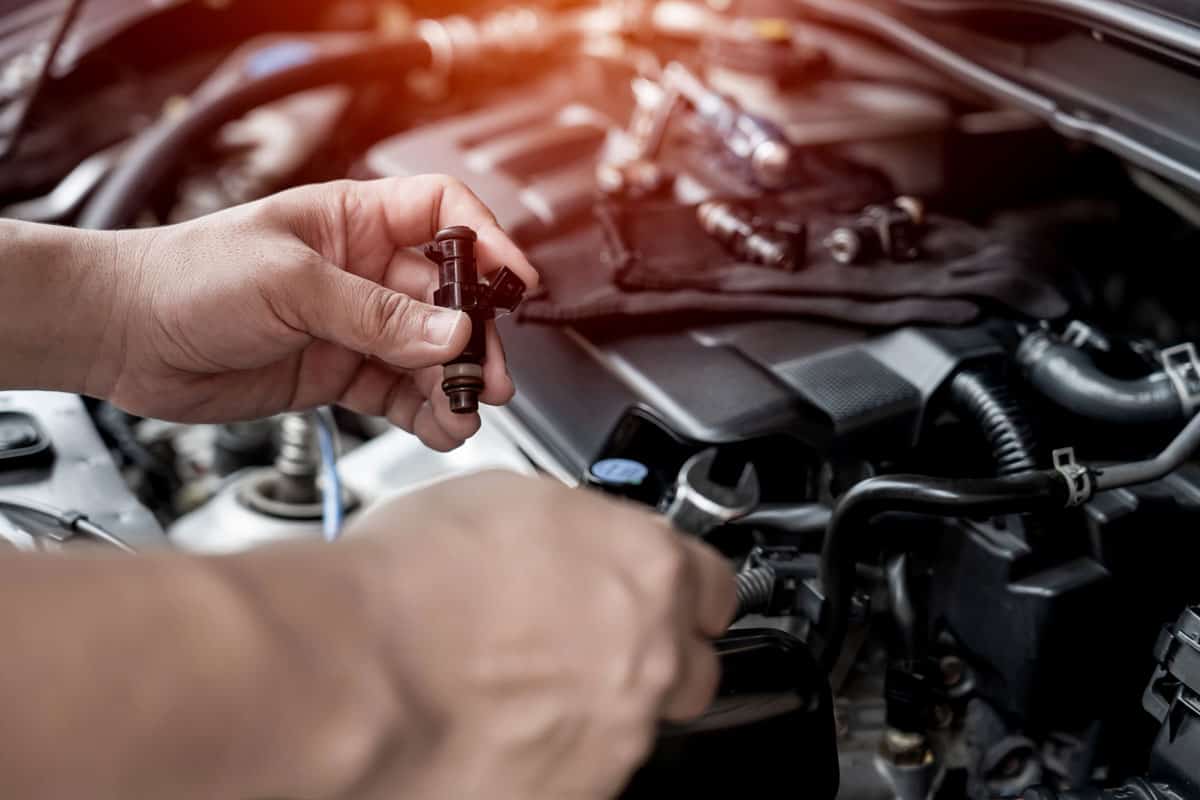
Debris and sludge buildup in the fuel system can negatively impact your vehicle's performance. Add fuel injector cleaner to your gas every 1,500 to 3,000 miles, and it will quickly dissolve all the contaminants and get your car's engine back to peak performance!
You may also enjoy the following posts:
Do Bad Fuel Injectors Make Noise?
Leaking Fuel Injector – Symptoms And What To Do
